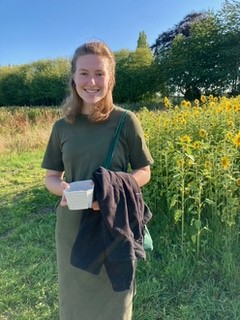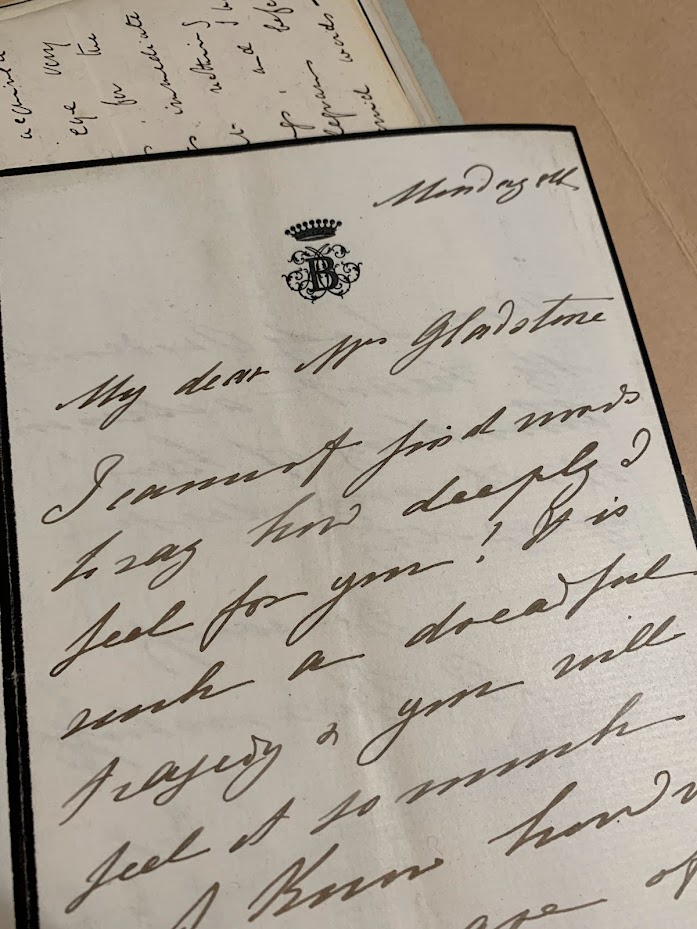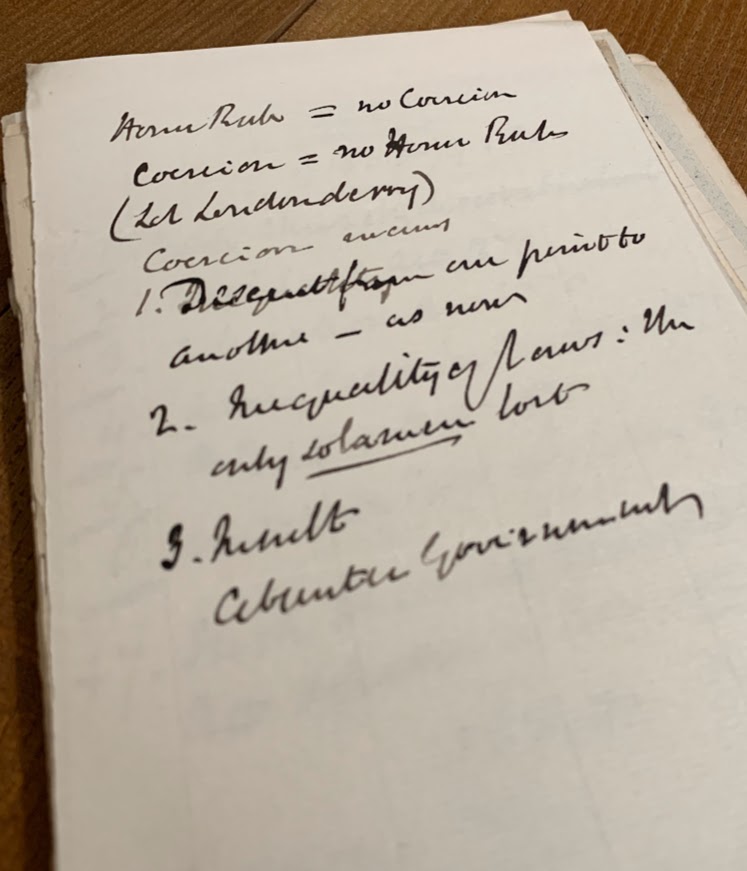Researchers from all over the world come to the Library to work with our special collections and archives. Our series of guest blog posts by visitors to Gladstone’s Library highlight the fantastic resource our collections can be for researchers from a variety of disciplines, and we hope they inspire you to explore our collections in new ways. If you are considering a research project, please get in touch by emailing [email protected].

By Lois Kildea, Lois is in her third year of studying Human, Social, and Political Sciences at St. John’s College, Cambridge, and is researching and writing her undergraduate dissertation on the intellectual origins of William Ewart Gladstone’s support for Irish Home Rule in the latter years of his expansive political career.
In mid-August 2022, I travelled from Northern Ireland to Hawarden to stay at Gladstone’s Library. The purpose of my week-long visit was to conduct primary research for my forthcoming dissertation on the intellectual origins of William Ewart Gladstone’s support for Irish Home Rule. Gladstone helped to establish a sense of Britain’s humanitarian obligation to others overseas, including across the Irish Sea as a liberal internationalist avant la lettre, and as the first British prime minister to attempt to reconcile the English and the Irish, to rescue the Anglo-Irish Union from its own iniquities. Yet, as an undergraduate Politics student (or rather, as an untrained historian), I felt somewhat daunted by the task that lay before me of searching through one restricted-access file after another for snippets of insight into Gladstone’s political thought. I hope that by sharing my experience at Gladstone’s Library I can reassure others who may feel similarly about the prospect of archival research that it is actually quite straightforward and at moments, surprisingly rewarding.
Prior to my visit, I contacted the staff at the Library to communicate my interest in researching Gladstone’s conversion to the cause of Irish Home Rule. In retrospect, I would have completed this preparatory step sooner because the staff were able to direct and refine my search for relevant items, and to offer further suggestions tailored to my specific interest. Furthermore, I learnt that to ensure access to archived items it is necessary to request them as early as possible, since they may be held offsite or since conservation work may be required before handling.
Whilst staying at Gladstone’s Library, I developed something of a routine. To set myself up for long stints in the Library, I devoured a warm croissant dripped with honey from the on-site restaurant, Food for Thought, each morning of my stay. Due to the age and importance of items in the archives, research must be conducted under staff supervision. Hence, to maximise the amount of archival work I could squeeze into staff working hours, after breakfast I headed straight to the Library.
Once seated in the centre of the main Theology reading room, I worked through my list of requested files. The content of these files varied from items of Gladstone’s personal correspondence to sympathy letters to him and his wife, Catherine, following the assassination of their niece’s husband, the newly appointed Chief Secretary of Ireland, by Irish republicans.[1] Other files contained bundles of newspaper articles tracking political developments on the Irish issue, selected, cut out and, occasionally, even annotated, by Gladstone himself.[2]

Due to the age of the items I was interested in, I lifted each with clean hands and lowered down to gain a closer look, rather than to raise the often filo-thin pages to eye-level. After a week at Gladstone’s Library, I will admit that archival research is not without challenges, and that a stiff neck seems to be one of them. I have learnt too that the modern eye is unaccustomed to deciphering Victorian calligraphy and that simply searching a file for a keyword is a privilege of research in the digital age, yet to be extended to many items from an earlier era. However, I have also reached the (possibly mistaken) conclusion that there is no sophisticated method to accelerate the process of archival research. In that sense, it’s quite a democratising activity: academic and undergraduate alike must simply sit down, open a file, and begin to trawl through it.
Perseverance is key to archival research because although one file may seem to contain nothing of any relevance to your looming dissertation, the very next file may be bursting with insights into the inner workings of the thought process of a former prime minister. Until you open a file and read its contents, you cannot know what you will find. My favourite, and indeed, unexpected, discovery at the Library was an assortment of loose pages used by Gladstone like nineteenth-century post-it notes. As I read through these notes, I could almost imagine Gladstone bullet pointing what he identified as the causes of Irish discontent, and hastily scribbling down a series of possible solutions. To give an example, the simplicity of his political logic was exemplified in one note which read:
Home Rule = no Coercion
Coercion = no Home Rule[3]

The discovery of this note and many others like it was satisfying twofold. The sense of relief having found something relevant to my research was accompanied by another feeling of privilege. After all, I have had the rare opportunity to lay my eyes upon the personal notes of a former prime minister regarding the political future of the place from where I am from.
On reflection, then, on my time at Gladstone’s Library, I would say that archival research is a relatively straightforward process provided one is prepared in-advance and focused, once there. I would encourage others unsure how to conduct archival research to give it a go, and to ask the lovely staff for help, because, as I have learnt, even the most inexperienced researcher can find some fascinating details about Gladstone, in the depths of an archived file, in the library that he established.
[1] GG/1021, ‘Letters of sympathy regarding the Phoenix Park murders, 1882’, Glynne-Gladstone Archive, Gladstone’s Library
[2] GG/1688, GG/1689, and GG/1690, ‘Press-cuttings regarding Irish question and Home Rule, 1865-1892’, Glynne-Gladstone Archive, Gladstone’s Library
[3] GG/1420/96, ‘Rough notes by W. E. Gladstone (press-cuttings, speech notes, etc.) relating mainly to Ireland and Home Rule, 1890-1894’, Glynne-Gladstone Archive, Gladstone’s Library
